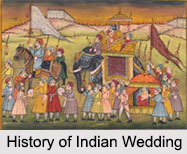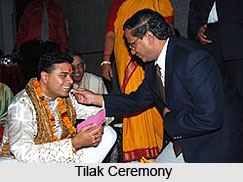In medieval India, the marriage was compulsory for all the girls except for those opted asceticism. Brahmin girls were married between ages eight and ten from sixth or century onwards up to the modern times. Polygamy was permitted to all who could afford, and it was especially popular among Kshatriyas for political reasons. According to the Manasollasa, the king should marry a Kshatria girl of noble birth for a chief queen though he is permitted to have Vaishya or Shudra wives for pleasure.
However, there were exceptions are seen in the prehistoric era where women could have their ways in regard to ruling kingdoms and acting as spiritual guides to their sons and preceding their husbands on political fronts. At the same time, ancient world had practices that set women up as trophies of war and competitions.
There were eight different ways this heavenly union took place. However, child marriage was not prevalent in ancient India, which became common in medieval ages due to political anarchy.
Divorce, while not banned, was a rare occasion. Marriage was seen as a bond for life, but if divorce did occur, generally the couple`s possessions were divided up equally, and any children stayed with the mother.
Once a couple was married, it was common for the groom to live with his bride`s family, although sometimes the couple was given their own place to live. The groom was supposed to look after and provide for his bride`s family, and he was to be subservient to his mother-in-law. There wasn`t typically a formal honeymoon, but the young couple was given plenty of alone time.
In the past, the selection of the couple was based on Shastric ideas. The guardians of the girl should not only see the boy`s body, but also consider his conduct, family means, education and repute. They should choose one whose age is more than the girl. The boy should be sound in body and in mind and his family should be free from hereditary diseases.
Weddings during the slave rule were more of a seizure than ritualistic marriage. Weddings during the slave rule were not performed as in the modern concept. Kings conquered the kingdoms, the conqueror often took away his choice as his bride and the consent of the bride was always not necessary.
Wedding in Mughal period Mughal Empire is an interesting period of Indian History. This is because; the Mughal history is so recent so as to blend with the issues of the current times. Wedding in Mughal period were a matter of pomp, show and extravagance. The Mughal Empire from the historical and trade perspective was not only a flourishing phase but the weddings in this era were significant and memorable creating another phase of history.
The impact of Islam on Indian weddings: The impact of Islam on Indian weddings has come up from the origin of the Mughal Empire. Indian Muslim marriages are celebrated in an impressive scale owing to their foundation from Mughal rituals. Indian Muslims pay a great respect and significance to their rituals as they have a great impact on their matrimonial lives. Indian Muslims all over their country share the same rituals and customs in marriage as followed by their people in Middle Eastern countries. Indian Muslim wedding rituals are experienced in three days similar to Indian Hindu weddings.
More on History of Indian Wedding
More on Indian Wedding Accessories
More on Indian Religious Weddings
More on Types of Marriages
See also



















